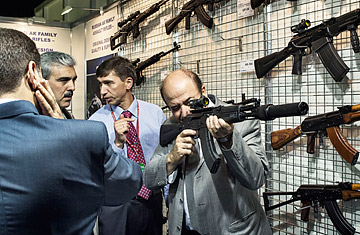
The head of the Syrian delegation to the semi-annual Russian arms bazaar, which is organized by the state weapons and engineering conglomerate Russian Technologies, tries out a new silencer-equipped Kalashnikov assault rifle, the AK-104, at an airfield near the town of Zykovsky, outside Moscow. The weapon is best for "house-to-house combat" and anti-terror raids, explains Andrei Vishnyakov (second from right), a salesman for the Russian weapons manufacturer Izhmash.
(2 of 3)
Moscow's Firepower
As the main weapons supplier to Damascus, Moscow has unmatched leverage with the Syrian regime. Syria has been a Kremlin client state since the 1970s, and apart from Iran, Russia is the only power that may be able to persuade Assad to step down. As international pressure mounts, Russia has shown new signs of impatience with the Syrian despot. On July 9, at a summit in Moscow with his entire ambassador corps, Putin ordered the diplomats to "do as much as possible to force the conflicting sides to reach a peaceful political solution." The same day, a delegation of Syrian revolutionaries arrived in Moscow for talks with the Foreign Minister, signaling that Moscow may have started looking for partners among the opposition, perhaps to retain influence with a post-Assad government. The Russians "have indicated for some time now that they are not invested in Assad specifically but rather are concerned about an outcome that maintains stability in Syria," says Ben Rhodes, President Obama's Deputy National Security Adviser. "They certainly have not closed the door to a political transition from Assad. The hurdle for them has been understanding and appreciating that there's no way to achieve stability with Assad still in power, and that's what we've been trying to convince them of in our conversations."
But at the weapons bazaar there was little sign that Russia intends to use its power in the arms trade to pressure Assad. "These are the guys we are rooting for," an official with Rosoboronexport told TIME while showing the Syrian delegates a set of truck-mounted rocket launchers. The Syrians climbed into armored trucks, studied surface-to-air missiles (SAMs) and discussed certain weapons systems at length with Rosoboronexport reps. But their chaperone, Colonel Isam Ibrahim As'saadi, the military attaché at the Syrian embassy in Moscow, declined to say what, if anything, they purchased that day, nor did he allow TIME to speak with them. The man As'saadi identified as the head of the delegation would say only that he had flown in from Damascus to attend the fair. "That shows a serious intention to buy," says Hugh Griffiths, an arms-trafficking expert at the Stockholm International Peace Research Institute (SIPRI), which tracks the global weapons market.
In recent years the Syrians have become increasingly good customers. According to SIPRI, which gets its data on the arms trade from open sources, Syria increased its arms purchases almost sixfold over the past five years, and at least 78% of those weapons came from Russia, the world's second largest arms dealer, after the U.S. This included deliveries of MiG-29 fighter jets, Pantsir-S1 rocket systems and Buk-M2E SAMs. "These are deterrents," says Griffiths. "They would make any foreign intervention in Syria a lot more costly."
They are also driving the rebels' rush to seek heavy weaponry of their own.
Stoking the Inferno
Just across the border from Syria, along a desolate stretch of the Mediterranean coast, one of North Lebanon's leading arms traffickers runs his business out of what looks like a repurposed seafood restaurant. Metal shutters are pulled down over the large plate-glass windows, and an empty aquarium embedded in the floor is growing lush with algae. Outside, half a dozen heavyset men dressed in identical khaki vests patrol the parking lot with walkie-talkies in their hands and pistols peeking out of their waistbands.
Inside, Abu Saddam, who uses a nom de guerre, has just gotten off the phone. About two hours ago, he says, he sent a big shipment to Syria. What kind? "Painkillers," he says, cocking an imaginary gun to his head. He refuses to say what type of weapons they were. But when asked whether they were for the Free Syrian Army, the loose confederation of military defectors and revolutionaries fighting Assad, Abu Saddam rolls his eyes. "Naturally," he says. "The FSA is like hell. The more you put fire into it, the more it asks for."
Over the past couple of months, he says, he has shipped several million dollars' worth of heavy weapons to Syria. At the beginning of the conflict, the FSA, which Abu Saddam and other sources say is funded by wealthy Saudi, Qatari, Emirati and Syrian individuals, among others, was buying anything it could get, including pistols and grenades. Now they want bigger things. "They want thermals," says Abu Saddam, meaning heat-seeking missiles. Something that could take out an airplane or a tank, like a SAM, would go for about $2,500, and he could get it "within five minutes." To prove the point, he tells one of his khaki-vested minions to open an armored metal door tucked behind a tattered curtain. His employee pulls out a couple of mortar rounds, then some SAMs.
All of them are sourced from Libya, he says. "You could not imagine the quantities they have," says Abu Saddam. The wiser heads among the sometimes fractious Libyan brigades that fought in that country's revolution want to ship the weapons out, he explains, before their postrevolutionary battles get any bloodier. The Libyans even help load the weapons onto cargo ships headed for Lebanon, Abu Saddam says. The ships fly French, Russian or U.S. flags, anything but Libyan, and the manifests are doctored to read wood, ceramics or sheet metal, anything but guns.
